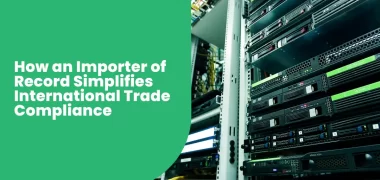In an increasingly interconnected global economy, businesses are often engaged in international trade to access new markets, diversify their supply chains, and reduce costs. However, navigating the complexities of international trade compliance can be a daunting task. This is where an Importer of Record (IOR) comes into play, offering a valuable service that simplifies the process. In this blog post, we will explore how an Importer of Record can streamline international trade compliance and help businesses successfully manage their cross-border operations.
Understanding the Role of an Importer of Record
An Importer of Record is a legal entity responsible for ensuring that imported goods comply with local laws and regulations. This role involves managing the entire import process, from documentation and customs clearance to paying duties and taxes. The IOR acts as the official importer on behalf of the business, assuming responsibility for compliance and regulatory requirements.
The Challenges of International Trade Compliance
International trade compliance involves adhering to a complex web of regulations that vary by country and product type. These regulations cover a wide range of areas, including:
- Customs Regulations: Each country has its own customs laws and procedures, which can be intricate and subject to frequent changes.
- Tariffs and Duties: Import duties, taxes, and tariffs must be accurately calculated and paid to avoid penalties and delays.
- Documentation: Proper documentation is critical for customs clearance and includes invoices, packing lists, certificates of origin, and more.
- Product Compliance: Specific regulations may apply to certain products, such as safety standards, labeling requirements, and environmental regulations.
- Trade Sanctions and Embargoes: Compliance with international trade sanctions and embargoes is essential to avoid legal repercussions.
- Security Regulations: Enhanced security measures and regulations, such as the Importer Security Filing (ISF) in the United States, must be followed.
Given these complexities, businesses must navigate a myriad of regulations to ensure their goods are imported legally and efficiently. An IOR simplifies this process by providing expertise and handling all aspects of compliance.
Benefits of Using an Importer of Record
1. Comprehensive Regulatory Knowledge
One of the most significant advantages of using an IOR is their comprehensive knowledge of international trade regulations. IORs are experts in the field, staying up-to-date with the latest changes in laws and regulations. This expertise ensures that your business remains compliant with all relevant requirements, reducing the risk of costly fines and shipment delays.
2. Efficient Customs Clearance
Customs clearance is a critical step in the import process, and any errors can lead to significant delays. An IOR handles all aspects of customs clearance, from preparing and submitting the necessary documentation to liaising with customs authorities. Their experience and established relationships with customs officials help expedite the clearance process, ensuring that your goods reach their destination promptly.
3. Accurate Duty and Tax Payments
Calculating import duties and taxes can be complex, especially when dealing with multiple jurisdictions. An IOR accurately determines the applicable duties and taxes for your shipments, ensuring that they are paid correctly and on time. This not only helps avoid penalties but also ensures that your goods are not held up at the border due to payment issues.
4. Proper Documentation Management
The import process requires extensive documentation, and any errors or omissions can lead to compliance issues. An IOR manages all necessary documentation, including invoices, packing lists, certificates of origin, and customs declarations. By ensuring that all paperwork is accurate and complete, the IOR helps facilitate smooth customs clearance and compliance with import regulations.
5. Mitigation of Legal and Financial Risks
Importing goods involves various legal and financial risks, including potential fines, penalties, and shipment delays. An IOR mitigates these risks by assuming responsibility for compliance with all relevant regulations. This transfer of liability protects your business from potential legal issues and financial losses associated with non-compliance.
6. Simplified Product Compliance
Different countries have specific regulations for certain products, such as electronics, pharmaceuticals, and food items. An IOR has the expertise to navigate these regulations, ensuring that your products meet all necessary standards and requirements. This includes managing product certifications, labeling, and safety standards, allowing your goods to enter the market without issues.
7. Compliance with Trade Sanctions and Embargoes
International trade sanctions and embargoes can have significant implications for businesses engaged in cross-border trade. An IOR ensures compliance with these regulations, helping your business avoid legal repercussions and maintain a positive reputation. By staying informed about current sanctions and embargoes, the IOR ensures that your shipments are not affected by these restrictions.
8. Enhanced Security Compliance
Security regulations, such as the Importer Security Filing (ISF) in the United States, require importers to provide advance information about their shipments. An IOR manages these security filings, ensuring that all necessary information is submitted accurately and on time. This helps prevent delays and ensures compliance with security regulations, reducing the risk of disruptions to your supply chain.
9. Streamlined Supply Chain Management
By handling all aspects of import compliance, an IOR allows your business to focus on core activities and strategic initiatives. This streamlines your supply chain management, improving overall efficiency and reducing administrative burdens. With an IOR managing the complexities of international trade compliance, your business can operate more smoothly and effectively.
10. Scalability and Flexibility
As your business grows and expands into new markets, your importation needs will evolve. An IOR provides the scalability and flexibility required to accommodate this growth. Whether you are importing a few shipments or managing a high volume of goods, an IOR can handle the increased workload efficiently. This scalability ensures that your business can continue to expand without being hindered by the complexities of international trade compliance.
Real-World Examples of IOR Benefits
To illustrate the benefits of using an IOR, consider the following real-world examples:
- Tech Company Expansion: A technology company based in the United States wanted to expand its market reach by importing electronic components from various countries. The company faced complex regulations regarding electronic imports, including safety standards and environmental regulations. By partnering with an IOR, the company ensured compliance with all relevant regulations, streamlined customs clearance, and avoided costly delays. This allowed the company to enter new markets quickly and efficiently.
- Pharmaceutical Importer: A pharmaceutical company needed to import active pharmaceutical ingredients (APIs) for its manufacturing operations. The importation of pharmaceuticals involves stringent regulations, including product certifications and labeling requirements. An IOR managed all aspects of compliance, including documentation and customs clearance, ensuring that the APIs were imported legally and efficiently. This allowed the pharmaceutical company to maintain a consistent supply of critical ingredients and avoid disruptions to its production process.
- Retail Expansion: A retail company sought to expand its product offerings by importing goods from multiple countries. The company faced challenges related to varying import duties, taxes, and product compliance requirements. An IOR handled all aspects of the import process, from duty calculations and payments to documentation management. This enabled the retail company to import a diverse range of products without encountering compliance issues or delays, supporting its growth and expansion efforts.
Conclusion
In conclusion, an Importer of Record simplifies international trade compliance by providing expertise, managing documentation, ensuring accurate duty and tax payments, and mitigating legal and financial risks. By leveraging the services of an IOR, businesses can streamline their import processes, enhance supply chain efficiency, and focus on core activities that drive growth and success.
Whether you are a small business looking to enter new markets or a large corporation managing a complex supply chain, an IOR can be a valuable partner in achieving your international trade goals. By outsourcing the complexities of compliance to experts, you can navigate the challenges of international trade with confidence and unlock new opportunities for your business in the global marketplace.




